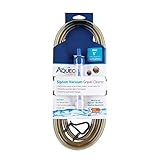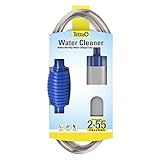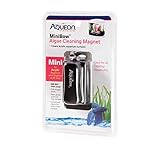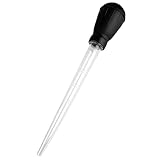Tiny tanks are having a big moment. Whether you’re nurturing a single betta, a micro-shrimp colony, or a minimalist aquascape on the corner of your standing desk, a crystal-clear two-gallon cube has an undeniable zen factor—until the first patch of green fuzz appears. The dirty secret of desktop aquariums is that their modest size doesn’t equate to modest maintenance; it only magnifies every speck of detritus. Choose the right mini cleaner, though, and you’ll shave routine scrub-time down to the length of your coffee break while keeping livestock safe and parameters rock-steady.
Because desktop ecosystems run on razor-thin margins—temperature swings, trace waste, nutrient spikes—your cleaning weapon must offer surgical precision, whisper-quiet operation, and near-zero footprint. The following guide walks you through fluid dynamics, filtration physics, material science, and biology so you can pick a device that disappears into the setup instead of stealing the spotlight. Skip the guesswork, and you’ll never have to apologize to co-workers for a humming motor or apologize to a betta for ammonia whiplash again.
Top 10 Mini Aquarium Cleaners
Detailed Product Reviews
1. DaToo Aquarium Mini Magnetic Scrubber Scraper Small Fish Tank Cleaner Nano Glass Aquarium Cleaning Tools with Super Strong Magnet

Overview: The DaToo Aquarium Mini Magnetic Scrubber is a compact cleaning tool designed for nano and small glass aquariums up to 8mm thick. Priced at just $5.92, it promises professional-grade cleaning power in a fun-sized package.
What Makes It Stand Out: This scrubber boasts N38 super-strong NdFeB magnets with 2600GS magnetic field strength, delivering 2-3 times more cleaning power than competitors. The dual-sided design features eco-friendly non-woven fabric for gentle cleaning and special abrasive fibers for tackling stubborn algae.
Value for Money: At under $6, this magnetic cleaner offers exceptional value. The durable ABS construction, permanent magnet technology, and one-year warranty make it a smart long-term investment for small tank owners.
Strengths and Weaknesses: The scrubber’s compact 4.5×2.1-inch size excels at reaching tight corners and cleaning nano tanks efficiently. The ergonomic handle provides comfortable grip during extended cleaning sessions. However, its 8mm maximum glass thickness limit means it’s unsuitable for larger aquariums. The strong magnets, while effective, might be challenging to separate if they snap together accidentally.
Bottom Line: The DaToo Mini Magnetic Scrubber delivers impressive cleaning power at an unbeatable price. Perfect for nano tank enthusiasts seeking professional results without breaking the bank.
2. Aqueon Aquarium Siphon Vacuum Gravel Cleaner Mini – 5 Inches

Overview: The Aqueon Mini Siphon Vacuum is a 5-inch gravel cleaner specifically designed for small aquariums between 1-5 gallons, making routine maintenance less messy and more efficient.
What Makes It Stand Out: This manual siphon requires no electricity or batteries – just simple up-and-down motion to start water flow. The included 6-foot flexible hose with bucket clip ensures controlled drainage without spills.
Value for Money: At $10.99, it’s reasonably priced for a specialized small-tank tool. The simplicity of design means fewer parts to break, potentially offering years of reliable service.
Strengths and Weaknesses: The mini size excels in tight spaces, making it perfect for planted nano tanks where larger siphons would damage vegetation. The generous 6-foot hose provides flexibility for bucket placement. However, the 5-inch intake tube might still be too long for very shallow setups under 6 inches. Manual priming can be tiring for those with larger water change volumes.
Bottom Line: A solid choice for small aquarium owners who want a no-frills, reliable gravel vacuum that gets the job done without complicated mechanisms.
3. DODO Aqua mini Aquarium Exchanger,Fish Tank Cleaning and Aquarium Water Exchanger siphoning. Ideal for Cleaning Small Fish Tanks and Sucking Away Dirt from The Bottom of The Tank.

Overview: The DODO Aqua mini Aquarium Exchanger is a specialized cleaning system for nano tanks, offering gentle water changes while removing waste from bare-bottom setups.
What Makes It Stand Out: This ultra-compact siphon features a flow rate of just 0.4 gallons per minute, allowing precise control during water changes. The transparent 4-foot rubber hose is anti-twist and fish-safe.
Value for Money: At $7.58, it offers excellent value for nano tank enthusiasts. The gentle flow prevents disturbing substrate or stressing delicate fish while effectively removing debris.
Strengths and Weaknesses: The small diameter hose excels at targeted cleaning, perfect for betta tanks and turtle setups. The hand-pump operation eliminates the need for mouth-priming. However, the limited flow rate means larger water changes take considerable time. Assembly required upon arrival might intimidate some users, though instructions are provided.
Bottom Line: Ideal for nano tank owners who prioritize precision over speed, especially those maintaining delicate ecosystems or bare-bottom setups.
4. Pawfly Aquarium Magnetic Brush Fish Tank Glass Cleaner 1 Inch Mini Stain Scrubber Pads Aquarium Cleaning Tool for 1/5 Inch Thick Fish Tank up to 10 Gallons (Non-Floatable)

Overview: The Pawfly Aquarium Magnetic Brush is a tiny 1-inch square cleaner designed for glass tanks up to 10 gallons with maximum 1/5-inch thickness, offering dual-sided cleaning action.
What Makes It Stand Out: Despite its miniature size, this brush delivers strong magnetic force. The square design enables reaching tight corners that round cleaners miss, while the dual-texture pads handle both gentle dusting and tough scrubbing.
Value for Money: At $5.99, it’s competitively priced within the mini magnetic cleaner market. The sturdy plastic construction suggests good durability for the price point.
Strengths and Weaknesses: The ultra-compact size (1.17×1.17 inches) makes it perfect for nano tanks and tight spaces. Strong magnets prevent accidental separation during cleaning. However, the non-floatable design means internal pieces can sink if separated. It’s specifically glass-only, excluding acrylic tank owners. The tiny size might be too small for those with larger hands or bigger tanks.
Bottom Line: A specialized tool for nano tank owners with glass setups who need precision cleaning in minimal space.
5. Tetra Water Cleaner Gravel Siphon for Aquariums, Easily Clean Freshwater Aquariums

Overview: The Tetra Water Cleaner Gravel Siphon is a comprehensive cleaning system designed for aquariums up to 55 gallons, promising 30-minute monthly water changes with 30% water replacement.
What Makes It Stand Out: This siphon includes everything needed for effective gravel cleaning: the main siphon, priming bulb, and bucket clip. The system efficiently removes debris from gravel while performing water changes simultaneously.
Value for Money: At $8.79, it offers excellent value for medium-sized tank owners. The included priming bulb eliminates the need for manual siphon starting, adding convenience worth the slight price premium.
Strengths and Weaknesses: The system works effectively across a wide range of tank sizes (up to 55 gallons). The priming bulb makes starting the siphon effortless, especially helpful for beginners. However, the siphon tube length isn’t specified, potentially causing issues with taller tanks. The “30 minutes for 30% water change” claim assumes optimal conditions that might not reflect every setup.
Bottom Line: A reliable, beginner-friendly option for aquarium owners seeking an all-inclusive gravel cleaning solution without complicated setup requirements.
6. Aqueon Aquarium Algae Scraper, Fish Tank Cleaning Magnets for Glass/Acrylic, Mini

Overview: The Aqueon Mini Algae Scraper is a magnetic, two-part cleaning pad designed for tanks up to 5 mm thick. One piece goes inside the water, the other stays dry outside; sliding the outer magnet drags the inner scrubber across glass or acrylic to wipe away algae without dunking your arm.
What Makes It Stand Out: The curved cleaning pad hugs both flat and bow-front surfaces, so you don’t leave untouched “dead zones.” If the magnets drift apart, the inner half simply drops straight to the substrate instead of floating away—retrieval takes seconds, not minutes of fishing with tongs.
Value for Money: At barely six dollars it’s cheaper than a single sushi roll; two refills are included, so the cost-per-clean is measured in pennies. Comparable magnet cleaners start around $10 and rarely include spare pads.
Strengths and Weaknesses:
Pros: feather-light, no cords, safe for acrylic, kid-friendly operation.
Cons: pad wears thin on coarse coral coatings; may snag on silicone seams; useless on tanks thicker than ¼ in.
Bottom Line: For nano and desktop aquariums this is the quickest, driest way to maintain a crystal-clear view—pick one up and stash the spare pad; you’ll forget algae was ever a problem.
7. Fish Tank Cleaning Waste Remover, 30ml Dropper Pipette for Aquarium Cleaning Tools, Manual Fish Tank Cleaner Water Changer, Black Fish Tank Rock Cleaner Tools, Mini Aquarium Gravel Cleaning Straw

Overview: This 11-inch hand pipette is a gravel vac for the syringe generation: squeeze the rubber bulb, plunge the tip into substrate, and watch mulm ride up the clear barrel. Milliliter scale marks (10–30 ml) double as a water-change meter or coral-feeding gauge.
What Makes It Stand Out: You control suction with finger pressure, so delicate shrimp tanks and rooted carpet plants aren’t sent flying. The narrow tip sneaks between rockwork where bulky siphons can’t fit, and the whole tool rinses clean in seconds.
Value for Money: Six bucks replaces both a mini gravel vac and a measuring cup; no buckets, no hoses, no tank-size minimum. It’s the cheapest path to spotless sand in pico or betta setups.
Strengths and Weaknesses:
Pros: silent, battery-free, kid-safe, great for target-feeding frozen rotifers.
Cons: only 30 ml per fill—large tanks require dozens of squeezes; soft plastic can crack if crushed; no check valve, so you may taste tank water if you forget to keep the tip submerged.
Bottom Line: Perfect for nano aquarists who need surgical precision; pair it with a hose extension if you own anything bigger than 20 g.
8. Fluval Easy Vac Gravel Cleaner, Mini

Overview: Fluval’s Easy Vac is a classic siphon that starts with a simple up-down pump. A 10-inch rigid tube attached to a 6-foot kink-resistant hose reaches the deepest corners of small and medium tanks while an integrated “gravel guard” keeps substrate from traveling.
What Makes It Stand Out: The oval-shaped intake slides into corners that round tubes skip, and the wide guard reduces the gravel storms that clog standard vacs. Once flow starts it’s continuous—no buckets to elevate or noisy pumps to babysit.
Value for Money: Just over $16 lands a name-brand cleaner that outlasts dollar-store versions whose hoses split after six months. Replacement parts are stocked at every pet chain, amortizing the cost across years of weekly water changes.
Strengths and Weaknesses:
Pros: fast prime, smooth shut-off clip, fits ½-inch gravel to coarse sand, hose length ideal for 10-30 g tanks.
Cons: rigid tube too wide for nano aquascapes; guard gaps still pass very fine sand; hose could be longer for stands taller than 30 in.
Bottom Line: If you maintain one moderately sized tank, this is the reliable, no-surprise gravel vac to own—set it, start it, and get on with your weekend.
9. hygger Small Fish Tank Cleaner, Aquarium Cleaning Tools Kit with Handle, Seaweed Scraper, Fishing Net, Sponge Brush,Wall Brush (S)

Overview: Hygger bundles four mini attachments—scraper blade, fine net, right-angle sponge, flat wall brush—onto one 8-inch handle designed for tanks under 10 gallons. Tool swaps are tool-free: pull, click, twist, done.
What Makes It Stand Out: Every head is scaled for tight spaces kids can reach, turning water-change day into a quick classroom project. The scraper lifts calcified spots without metal blades, while the corner sponge cleans silicone seams that pads miss.
Value for Money: Twelve dollars replaces a drawer of improvised utensils (credit card scrapers, bamboo skewers, unraveled scouring pads). ABS plastic won’t rust, so the kit survives high-humidity cabinets.
Strengths and Weaknesses:
Pros: light, colorful, child-safe edges, four dedicated functions in one footprint.
Cons: handle flexes under pressure; no algae pad for curved acrylic; net ring is tiny—fine for fry, awkward for adult guppies.
Bottom Line: A tidy, frustration-free starter set for desktops, bowls, and betta boxes; grab it if you’re tired of knuckle-scraping contortions every Sunday.
10. DFsucces Fish Tank Cleaning Tools, Mini Manual Fish Tank Water Changer Aquarium Dropper,Extendable Fish Tank Cleaning Waste Remover, for Fish Tank(45cm/1Pcs)

Overview: At 45 cm (17.7 in) this extended pipette reaches the substrate of tall column tanks without wetting your sleeve. A rubber joining tube lets you snap on extra length if you upgrade to deeper setups later.
What Makes It Stand Out: The extra reach plus a 30 ml graduated barrel means you can vacuum detritus behind towering rock stacks or feed resin corals on the sand bed—tasks shorter droppers simply can’t manage.
Value for Money: Seven dollars for carbon-length reach rivals DIY PVC contraptions that cost twice as much and look clunky. It ships as one piece, so there are no lost parts syndrome.
Strengths and Weaknesses:
Pros: crystal-clear plastic shows flow, gentle suction perfect for shrimp larvae, doubles as precise chemical doser.
Cons: still only 30 ml capacity—big tanks need patience; thin barrel flexes if handled roughly; rubber connector may loosen over time.
Bottom Line: Tall-tank keepers finally get the control of a pipette with the arm extension of a gravel vac—thread it through hardscape and suck waste without rearranging your aquascape.
Understanding Desktop Aquarium Cleaner Categories
Siphons and Gravel Vacs for Nano Tanks
Compact Magnet Cleaners for Glass and Acrylic
Sponge & Internal Filters With Detachable Skimmers
USB-Powered Micro Vacuums and Gravel Sweepers
Algae Scrubber Pens and Reach Tools
Live Cleaners: Shrimp, Snails, and Nano Fish
Maintenance Kits vs Individual Tools
Why Size Isn’t the Only Metric That Matters
The Lowdown on Wattage and Flow Rates
Head Pressure: Tiny Lift, Big Impact on Performance
Weighted vs Hand-Held Designs for One-Hand Operation
Matching Cleaner Power to Bioload
Ammonia Phantoms in Heavily Fed or Shrimp-Only Tanks
Plant-Heavy Systems: When Mulch Overrules Fish Waste
pH Swings and CO₂ Considerations for Aquascapers
Filtration vs Physical Cleaning: Finding Balance
Mechanical vs Chemical vs Bio-Media Explained
When to Vacuum, When to Rinse, and When to Leave It Alone
Sponge Prefilters to Protect Fry and Baby Shrimp
Addressing Nano-Tank Algae Categories
Green Dust, Green Spot, Brown Diatoms, and Blue-Greens
How Silica, Nitrates, and Inconsistent Lighting Play In
Short-Wavelength LEDs: Friend & Foe of the Desktop Setup
Noise and Vibration Control in Office Environments
Decibel Ratings That Won’t Earn You Noise Complaints
Isolation Feet and Silicone Dampening Rings
Battery/USB Options for Cord-Free Cleaning Retreats
Materials Matter: Aquarium-Safe Plastics and Magnets
ABS vs Polystyrene and Leaching Concerns
Neodymium Magnet Strength Ratings for ≤6 mm Glass
Ceramic, Titanium, or Stainless in Saltwater Nanos
Eco-Friendly Disposal and Water Changes
Gallon-for-Gallon Scheduling to Prevent Temperature Shock
Capturing Waste Water for Office Plants—Tips and Caveats
Carbon Footprint of Battery vs Plug-In Devices
Maintenance of Your Cleaning Tools
Chlorine Taste Tests: Why Sponges Turn Nasty
Monthly Descale for Hard-Water Residue
Drying Stations That Stop Mold Between Uses
Budget vs Premium: Where Spending Actually Pays Off
O-Rings, Gaskets, and Impellers: Consumables Map
Warranty Terms in Equipment Under $30
The Hidden Costs of Replacing Baby Shrimp Colonies
Red Flags and Overhyped Specifications
“Adjustable Flow” That Only Tweaks Air Bubbles
Thinline Magnets Losing Grip in Saltwater
UV Sterilizers Advertising 3 W as Algae Cure-Alls
Frequently Asked Questions
Q1. Will a gravel vacuum disturb my rooted Monte Carlo carpet?
Q2. Can I run a nano sponge filter on a timer, or does it need to stay on 24/7?
Q3. How often should I clean a magnet scrubber itself to stop micro-scratches?
Q4. Are battery vacuums strong enough to pull up shrimp fry?
Q5. Is tank temperature at risk during a 50% water change with a mini siphon?
Q6. Do USB-powered cleaners still function when plugged into a power bank?
Q7. Will adding an amano shrimp eliminate the need for manual scrubbing entirely?
Q8. How do I know if my magnet is too powerful for 3 mm acrylic?
Q9. Should I remove activated carbon before medicating a sick betta?
Q10. Are algae scrubs safe to use on low-iron, opti-white glass?